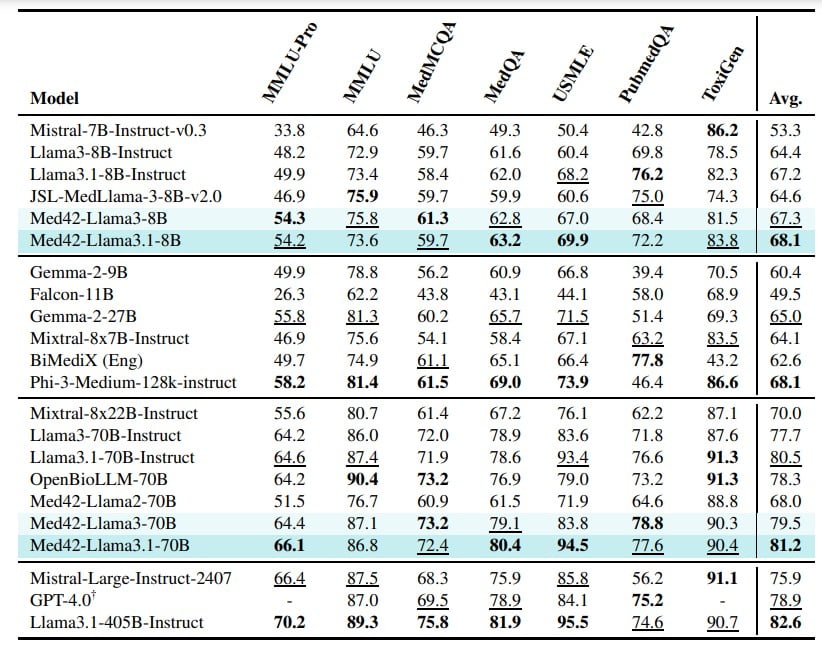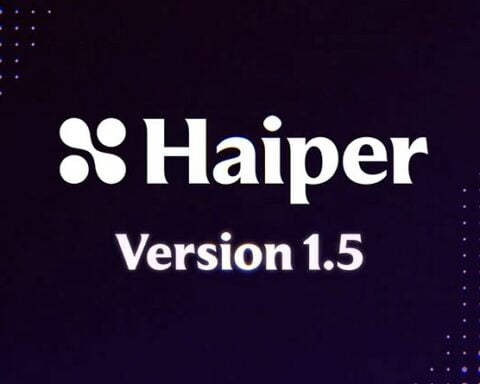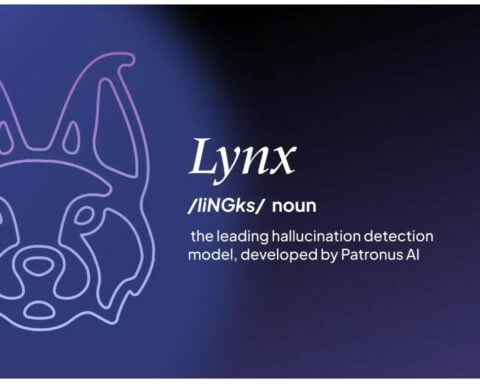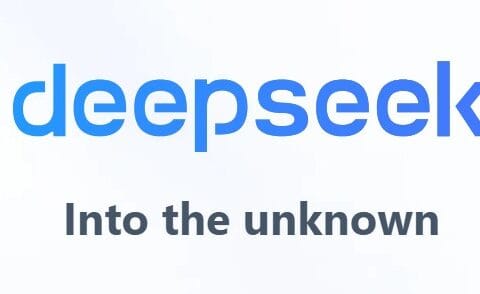Last Updated on August 16, 2024 11:29 am by Laszlo Szabo / NowadAIs | Published on August 16, 2024 by Laszlo Szabo / NowadAIs
Med42-v2: The AI Doctor That Outshines OpenAI’s GPT-4 – Key Notes
- Precision Medicine: Med42-v2 is a suite of clinical language models fine-tuned specifically for healthcare, boasting a 85.1% zero-shot accuracy on the USMLE.
- Advanced Architecture: Built on the Llama3 foundation, Med42-v2 uses specialized clinical datasets and preference alignment for high performance.
- Ethical AI: Med42-v2 has been meticulously designed to meet stringent ethical and safety standards, addressing the unique challenges of the healthcare sector.
- Global Collaboration: Available on Hugging Face, Med42-v2 encourages open access and global collaboration, aiming to set new benchmarks in medical AI.
LLMs for Human Healthcare
The healthcare sector stands poised for a transformative revolution. At the forefront of this paradigm shift is Med42-v2, a suite of clinical large language models (LLMs) meticulously engineered to surmount the limitations that have historically impeded the seamless integration of generic AI models into healthcare settings.
Developed by the visionary researchers at M42, a tech-driven healthcare group based in Abu Dhabi, Med42-v2 represents a monumental leap forward in the quest to harness the immense potential of AI for enhancing patient care, streamlining clinical workflows, and propelling medical research to unprecedented heights.
Transcending the Barriers: Med42-v2’s Inception
The inception of Med42-v2 can be traced back to the inherent challenges that have plagued the deployment of generic language models in the healthcare domain. While these models have undoubtedly demonstrated remarkable capabilities across various sectors, their application in clinical settings has been hindered by a multitude of factors, including:
- Lack of Domain-Specific Knowledge: Generic models often struggle to comprehend the intricate nuances of medical terminology, clinical reasoning, and the complexities inherent in navigating healthcare scenarios.
- Ethical and Safety Concerns: The high-stakes nature of the healthcare industry necessitates an unwavering commitment to accuracy, reliability, and adherence to stringent ethical standards – a feat that generic models have yet to consistently achieve.
- Preference Alignment: Many generic models are intentionally preference-aligned to avoid engaging with clinical queries, effectively rendering them inadequate for healthcare applications.
Recognizing these limitations, the researchers at M42 embarked on an ambitious endeavor to develop a suite of LLMs tailored explicitly for the healthcare sector, one that could seamlessly integrate domain-specific knowledge, ethical considerations, and user preferences into its core architecture.
Architectural Ingenuity: The Backbone of Med42-v2

At the heart of Med42-v2 lies the Llama3 architecture, a technological marvel that serves as the foundation upon which these clinical LLMs are built. This advanced architecture, coupled with meticulous fine-tuning using specialized clinical datasets, endows Med42-v2 with an unparalleled depth of understanding and proficiency in navigating the complexities of medical queries.
Fine-Tuning for Clinical Excellence
The fine-tuning process employed in the development of Med42-v2 is a testament to the researchers’ unwavering commitment to precision and accuracy. Leveraging a meticulously curated dataset comprising a diverse array of medical and biomedical resources, the models underwent rigorous training to enhance their comprehension of clinical contexts, chain-of-thought reasoning, and conversational nuances.
Notably, a carefully selected subset of general domain data, accounting for 26.5% of the final training dataset, was seamlessly integrated, further bolstering the models’ linguistic versatility and ensuring their ability to excel across a broad spectrum of tasks.
Preference Alignment: Bridging the Gap Between AI and Human Expectations
While fine-tuning played a pivotal role in imbuing Med42-v2 with clinical prowess, the researchers recognized the equal importance of aligning the models’ outputs with human preferences and ethical standards. To achieve this critical objective, a multi-stage preference alignment process was meticulously implemented.
Leveraging open-access preference datasets such as UltraFeedback and Snorkel-DPO, the researchers employed an iterative approach, progressively refining the models’ outputs to meet the exacting requirements of the healthcare industry. This innovative alignment strategy not only enhances Med42-v2’s ability to engage with clinical queries but also ensures that its responses adhere to the highest ethical and safety standards.
Unparalleled Performance: Med42-v2’s Empirical Prowess

The true testament to Med42-v2’s remarkable capabilities lies in its unparalleled performance across a comprehensive suite of medical benchmarks. In rigorous zero-shot evaluations, encompassing a diverse array of tasks ranging from medical exam questions to research datasets, Med42-v2 has consistently outperformed its predecessors, surpassing even the vaunted GPT-4 model.
On benchmarks such as the USMLE (United States Medical Licensing Examination), Med42-v2’s 70B parameter configuration has achieved a staggering zero-shot accuracy score of 85.1%, with a maximum accuracy of 87.3% when leveraging specialized prompting techniques. This unprecedented level of performance underscores Med42-v2’s potential to revolutionize clinical decision-making, patient care, and medical research on an unprecedented scale.
Accessibility and Collaboration: Fostering Innovation
In a commendable display of commitment to scientific progress and open collaboration, the researchers at M42 have made Med42-v2 publicly available through the renowned Hugging Face platform. This open-access approach not only facilitates the dissemination of research but also invites developers, healthcare institutions, and stakeholders from around the globe to participate in the review, testing, and experimentation processes.
Furthermore, M42 has pledged to release comprehensive datasets, a code repository, and a detailed research paper outlining their novel evaluation framework for clinical LLMs – a framework that promises to set new standards for assessing the efficacy and reliability of AI models in healthcare settings.
Ethical Considerations and Future Directions
While the potential benefits of Med42-v2 are undeniably profound, the researchers at M42 remain acutely aware of the ethical considerations and potential limitations that accompany the integration of AI into healthcare systems. Despite the model’s superior performance and rigorous training protocols, the possibility of hallucinations, biases, and ethical concerns cannot be entirely eliminated.
To address these challenges, M42 is committed to ongoing research and development, with a particular focus on developing a comprehensive evaluation framework tailored explicitly for assessing the clinical utility of LLMs. By rigorously testing these models in real-world scenarios, the researchers aim to identify and mitigate potential risks, ensuring that Med42-v2 and its successors can be seamlessly and safely integrated into healthcare settings without compromising patient safety or ethical standards.
Conclusion: A Paradigm Shift in Healthcare AI
The introduction of Med42-v2 represents a paradigm shift in the realm of healthcare AI, a testament to the relentless pursuit of innovation and the unwavering commitment to enhancing patient care through AI technology. With its unparalleled performance, domain-specific expertise, and ethical underpinnings, Med42-v2 stands poised to change the AI healthcare landscape, ushering in a new era of clinical decision-making, patient engagement, and medical research.
Descriptions
- Llama3 Architecture: The backbone of Med42-v2, Llama3 is a cutting-edge AI architecture known for its powerful language processing capabilities. It is specifically designed to understand complex medical queries, making it a perfect fit for healthcare applications.
- Fine-Tuning: This is the process of refining an AI model using a specialized dataset to enhance its performance in a particular domain. For Med42-v2, fine-tuning involved extensive training with clinical datasets to ensure accuracy in medical contexts.
- Zero-Shot Accuracy: A measure of how well an AI model can perform on tasks it wasn’t explicitly trained for. Med42-v2 achieves an impressive 85.1% accuracy on the USMLE, showcasing its ability to handle a wide range of medical queries without prior specific training.
- Preference Alignment: In AI, this refers to the process of adjusting a model’s outputs to match human ethical standards and preferences. Med42-v2 has undergone rigorous preference alignment to ensure its responses are safe, ethical, and aligned with the needs of healthcare professionals.
- Hallucinations in AI: When an AI model generates incorrect or nonsensical information, often due to the complexities of interpreting vast amounts of data. Despite Med42-v2’s advanced design, the potential for hallucinations remains a challenge, necessitating careful oversight in medical applications.
- USMLE (United States Medical Licensing Examination): A standardized exam in the United States that assesses a physician’s ability to apply knowledge, concepts, and principles in medicine. Med42-v2’s high accuracy on this exam highlights its potential utility in clinical settings.
- Open-Access Collaboration: Med42-v2 is available on Hugging Face, a platform that fosters open collaboration among developers, researchers, and healthcare professionals worldwide. This approach ensures continuous improvement and adaptation of the AI to real-world medical challenges.
Frequently Asked Questions
- What is Med42-v2 and how does it improve upon previous models? Med42-v2 is a clinical large language model developed by M42, specifically designed for the healthcare sector. Unlike generic AI models, Med42-v2 has been fine-tuned using specialized clinical datasets, resulting in significantly higher accuracy in medical contexts, including an 85.1% zero-shot accuracy on the USMLE.
- How does Med42-v2 ensure ethical and accurate responses in healthcare? Med42-v2 incorporates a rigorous preference alignment process, using open-access datasets like UltraFeedback and Snorkel-DPO. This ensures that its outputs not only meet clinical accuracy but also adhere to the ethical standards required in healthcare, minimizing risks such as misinformation or unethical decision-making.
- What are the potential limitations of Med42-v2 in a clinical setting? While Med42-v2 is highly advanced, it is not without limitations. The model can still experience “hallucinations,” where it generates incorrect information, and there are concerns about biases in its training data. These factors require that human oversight remains integral when using Med42-v2 in critical medical decisions.
- How can healthcare professionals access and utilize Med42-v2? Healthcare professionals can access Med42-v2 via the Hugging Face platform, where it is available for review, testing, and integration into various applications. M42 encourages global collaboration to refine the model further, ensuring it meets the diverse needs of healthcare environments worldwide.
- What is the significance of Med42-v2’s performance on the USMLE? Med42-v2’s high accuracy on the USMLE is a strong indicator of its potential effectiveness in clinical decision-making. It suggests that the model can assist healthcare providers in diagnosing and treating patients by providing reliable, well-informed recommendations based on extensive medical knowledge.












